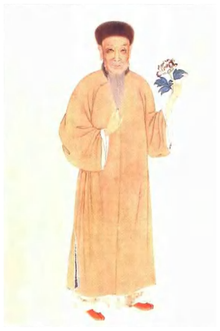賴德和〈咬舌詩〉(詩:向陽)
https://www.youtube.com/watch?v=Blwx6EmGDCw&feature=share
If at eighty you're not a cripple or an invalid, if you have your health, if you still enjoy a good walk, a good meal (with all the trimmings), if you can sleep without first taking a pill, if birds and flowers, mountains and sea still inspire you, you are a most fortunate individual and you should get down on your knees morning and night and thank the good Lord for his savin' and keepin' power.[54]


| 袁枚 | ||
|---|---|---|

《清代學者像傳》第一集之《袁枚像》,清葉衍蘭摹繪
| ||
大清江蘇江寧縣知縣
| ||
| 籍貫 | 浙江省錢塘縣 | |
| 族裔 | 漢族 | |
| 字號 | 字子才,號簡齋,別號隨園老人 | |
| 出生 | 康熙五十五年三月二日 1716年3月25日 浙江省錢塘縣 | |
| 逝世 | 嘉慶二年十一月十七日 1797年1月3日(80歲) 江蘇省江寧縣 | |
| 出身 | ||
| ||
| 著作 | ||
| ||
| Title | Yuan Mei: Eighteenth Century Chinese Poet Eighteenth Century Chinese Poet |
| Author | Arthur Waley |
| Edition | reprint |
| Publisher | Stanford University Press, 1970 |
| ISBN | 0804707197, 9780804707190 |
| Length | 227 pages
簡析袁枚和性靈派的形成
發佈時間: 2007/5/24 9:39:06被閱覽數:158次來源: 中國國學網 袁枚生活通脫放浪,個性獨立不羈,頗具離經叛道、反叛傳統的色彩。他宣揚性情至上,肯定情慾合理,在性與情上,主張即“情”求“性”(《書复性書後》),突出尊情;在言志與言情上,認為“詩言志,言詩之必本乎性情也”(《隨園詩話》卷三)。他強調情是其詩論的核心,男女是真情本源。他與沈德潛等人反复辯論,公開為寫男女之情的詩歌張目,在當時頗有震聾發聵之效。他還鮮明地表示:“鄭孔門前不掉頭,程朱席上懶勾留”(《遣興》),認為“宋學有弊,漢學更有弊”(《答惠定宇書》),宋儒偏於心性之說近乎玄虛,而漢德偏於箋注也多附會,進而質疑“六經”,指出其言未必“皆當”“皆醇”,並藉莊子之語抨擊“六經盡糟粕”(《偶然作》),對虛偽的假道學深惡痛絕,表現出封建社會末期個性解放思想再次甦醒。袁枚論詩宗尚性靈。所謂“性靈”,其含意包括性情、個性和詩才。性情是詩歌的第一要素,“性情以外本無詩”(《寄懷錢嶼沙方伯予告歸里》),即是說詩生於性情,性情是詩的本源和靈魂,詩人要“自把新詩寫性情”。而這種性情要表現出詩人的獨特個性,“作詩不可無我”,“有人無我,是傀儡也”(《隨園詩話》卷七),沒有個性,也就喪失了真性情,《續詩品》闢“著我”一品,就是明確提倡創寫“有我”之旨。這是性靈說審美價值的核心。然而僅有個性、性情是不夠的,還應具備表現這一切的詩才,“詩人無才,不能役典籍運心靈”(《蔣心馀藏園詩序》),藝術構思中的靈機與才氣、天分與學識要結合併重。這一在“吟詠性情”的基點上構成完整體系的詩歌理論,衝破了傳統與時代風尚,對格調模擬復古、肌理考據學問、神韻纖巧修飾、浙派瑣屑給予有力的衝擊,是晚明文藝思潮的隔代重興,為清詩開創了新的局面。 袁枚作詩以才運筆,抒發性靈,極有特色。他的筆觸相當廣泛,反映現實、詠物懷古、描繪山川自然和表現個人誌趣,大都不受傳統思想束縛和正宗格調限制,信手拈來,矜新鬥捷,不盡遵軌範。而且清靈雋妙,具有感情奔放、議論新穎、筆調活潑、語言曉暢、句法靈巧等特點,從內容到形式都有一定的創新。如《馬嵬》其二: 莫唱當年長恨歌,人間亦自有銀河。石壕村里夫妻別,淚比長生殿上多。詩以白居易《長恨歌》與杜甫《石壕吏》對比,將帝妃悲劇轉向民間夫妻慘別,翻出新意的同時滲透著對百姓疾苦的深切同情。類似關心民瘼的作品還有《苦災行》、《南漕嘆》、《捕蝗歌》等,揭露社會弊病的作品則有《雞》、《偶然作》、《養馬圖》等。抒述骨肉之情的《隴上作》、《哭三妹五十韻》、《哭阿良》等感情真摯,清婉淒惻。 袁枚性好遊覽,寫景之作模山範水,落想不凡,筆墨放縱。《同金十一沛恩遊棲霞寺望桂林諸山》、《觀大龍湫作歌》等膾炙人口,前者寫桂林群山和七星岩溶洞的奇幻景象,從神話傳說寫到詭譎奇形,縱橫跌宕,興會淋漓。另有一部分小詩則以清新靈巧見長,如《苔》: 各有心情在,隨渠愛暖涼。青苔問紅葉,何物是斜陽? 在極簡淡的勾畫中,蘊含了對自然生命的多樣品性的欣賞、讚美。正如其《遣興》詩所云:“夕陽芳草尋常物,解用都為絕妙詞。”《湖上雜詩》更有別出心裁的情趣: 桃花吹落沓難尋,人為來遲惜不禁。我道此來遲更好,想花心比見花深。這些詩也如同他說:“只將尋常話作詩。”無論從內容或形式說,袁枚詩都顯示出向近代文學演進的歷史徵兆。 與袁枚並稱“乾隆三大家”的是趙翼和蔣士銓。趙翼(1727~1814)論詩崇性靈,“力欲爭上游,性靈乃其要”。(《閒居讀書》)他更重視創新,“不創前無有,焉傳後無窮”(《讀杜詩》),“詩文隨世運,無日不趨新”(《論詩》) ,強調不囿於成法,敢於破除宗唐宗宋的門戶習氣,自信“江山代有才人出,各領風騷數百年”。其詩議論精警,思想敏銳,幽默詼諧,兼雜以雄奇豪放的氣概,《論史》、《偶得》、《閒居讀書》等為其見解精闢的代表作。他的創作個性分明,即使一首小詩也旨意洞達,如《曉起》:“茅店荒雞叫可憎,起來半醒半懵騰。分明一段勞人畫,馬囓殘芻鼠瞰燈。”純用白描,寫其羈旅生涯的疲憊與艱辛,卻無一絲消沉,洋溢著才情和樂觀風采,是其心靈的映現。蔣士銓(1725~1785)也主張“文章本性情,不在面目同”(《文章四首》),但其性情還包含“忠孝節義之心,溫柔敦厚之旨”,如《題文信國遺像》、《南池杜少陵祠堂》等,和袁枚等人有所不同。其描寫盛世下的苦難,如《京師樂府詞十六首》、《饑民嘆》、《雞毛房》等作,別開生面,值得重視。抒寫親情有《出門》、《歲暮到家》等,感人至深。如後者: 愛子心無盡,歸家喜及辰。寒衣針線密,家信墨痕新。見面憐清瘦,呼兒問苦辛。低迴愧人子,不敢嘆風塵。 張問陶(1764~1814)師承袁枚,高唱“文章體製本天生,只讓通才有性情”,“天籟自鳴天趣足,好詩不過近人情”。(《論詩十二絕句》)其詩多“騷屑之音”,有《出棧宿寶雞縣題壁十八首》、《拾楊ㄗ 》等詩,遊記懷古之作有《初冬赴成都過安居題壁》、《紫柏山謁留侯祠》等。他和袁枚一樣,敢於鄙薄道學,“理學傳應無我輩”(《斑竹塘車中》)。他有不少與妻子唱和、抒寫夫妻之愛的詩,如《春日憶內》:“房幃何必諱鍾情,窈窕人宜住錦城。小婢上燈花欲暮,蠻奴掃雪帚無聲。春農互覆宵寒重,繡被聯吟曉夢清。一事感卿真慧解,知餘心淡不沽名。”暢所欲言,無所顧忌,反映出思想的解放。 屬於性靈派,和“乾隆三大家”對稱的“後三家”是舒位、王曇和孫原湘。其中舒位、王曇是龔自珍的先導,後者更為直接。 舒位(1765~1816)詩題材廣泛,羈旅行役、詠史記遊等篇什,性靈與才學兼具,寫得灑脫自如,得心應手,且材藻艷麗,旁徵博引,如《說蟹三十韻》 、《鸚鵡地圖》等。集華美辭藻與縱橫馳騁為一體的有《破被篇》、《鐵蕭歌贈朱亦林》等,龔自珍評之為“鬱怒橫逸”,顯示出乾嘉詩壇風尚轉變的新動向。王曇(1760~1817)一生未仕,窮困終身。《重過谷城,書宋汝和觀察項王碑》、《項王廟》等篇是感慨自身的代表作,借憑弔項羽抒發懷才不遇的憤懣,哭人哭己,喟嘆“英雄”身後淒涼,大筆淋漓,詭怪離奇,帶有幾分粗豪,為龔自珍詩歌的濫觴。孫原湘(1760~1829)的詩清麗俊逸,富巧思,多麗語。《清史稿》本傳稱“位艷、曇狂,惟原湘以才氣寫性靈,能以韻勝”。 乾嘉詩壇上,吟唱盛世悲歌,可視為性靈派外圍的是鄭燮、黃景仁等。 鄭燮(1693~1765)字克柔,號板橋,江蘇興化人。乾隆元年(1736)進士,任山東範縣、濰縣知縣,饒有政聲,後以疾辭官。他擅長書畫,為“揚州八怪”之一。他論詩提倡“真氣”、“真意”、“真趣”三真,推崇杜甫“歷陳時事,一寓諫諍”,主張詩歌應“道著民間痛癢”(《濰縣署中與舍弟第五書》)。他的《鄭板橋集》中有許多詩反映民生疾苦,揭露現實黑暗,如《孤兒行》、《私刑惡》、《悍吏》等,直率大膽,為一般詩人少有。他的抒發才情之作也較多,表現出磊落高尚的人格精神,如《濰縣署中畫竹呈年伯包大中丞括》:“衙齋臥聽蕭蕭竹,疑是民間疾苦聲。些小吾曹州縣吏,一枝一葉總關情。”《和學使者於殿元枉贈之作》之一:“十載揚州作畫師,長將赭墨代胭脂。寫來竹柏無顏色,賣與東風不合時。”質樸潑辣,獨樹一格。 黃景仁(1749~1783)字仲則,自號鹿菲子,武進(今江蘇常州)人。他一生窮困潦倒,遭際淒涼,自嘆“一身墮地來,恨事常八九”(《冬夜左二招飲》)。他作詩“好作幽苦語”,放言無忌地傾洩“盛世”積在心頭的怨憤,如:“我曹生世良幸耳,太平之日為餓民。”(《朝來》)這在文網高張的乾隆之世,不啻是橫破夜天的變徵之音。又如《癸巳除夕偶成》二首之一:“千家笑語漏遲遲,憂患潛從外物知。悄立市橋人不識,一星如月看多時。”詩人依稀感覺危機來臨,盛世將衰。他常以“落日”、“西日”、“斜陽”、“暮氣”、“晚秋”等意象寫景抒情,以“得風氣先”,敏銳地感覺到世事殆將有變的徵兆,寫出個人對社會變遷的“憂患”。 他還在詩裡抨擊是非不分、倒行逆施的黑暗世道,如《悲來行》、《泥塗嘆》、《獻縣汪丞座中觀伎》;揭露人情澆薄,世態炎涼,如《啼烏行》、《沙洲行》、《和錢百泉雜感》;哀民生之艱,同情民眾之苦,如《苦暑行》、《渦水舟夜》等。有些嗟貧嘆苦和訴說生活窘迫的篇什,如“全家都在風聲裡,九月衣裳未剪裁”(《都門秋思》),“茫茫來日愁如海,寄語羲和快著鞭” (《綺懷》之十六),“慘慘柴門風雪夜,此時有子不如無”(《別老母》)等句,唱出封建時代寒士的心聲,也撕開了“盛世”的虛幻面紗。 潛知的“憂患”和過人的哀樂,使他對現實極為清醒,積鬱滿懷,並自視甚高,不肯伏就,以詩歌表現出個性意識在復蘇和覺醒意義上的深入思考,如《雜感》: 仙佛茫茫兩未成,只知獨夜不平鳴。風蓬飄盡悲歌氣,泥絮沾來薄亻幸名。十有九人堪白眼,百無一用是書生。莫因詩卷愁成讖,春鳥秋蟲自作聲。 詩人能博採唐人而自出機杼,“自作聲”以發“不平鳴”。他的七言古詩以雄偉的筆觸描繪壯麗的自然景色和抒發磊落恣放之情,既似李白豪宕騰挪,又兼韓愈盤轉古硬,在跌宕跳躍中流轉低吟。《笥河先生偕宴太白樓醉中作歌》是其名篇,全詩恣肆橫放,直造太白之室,見者以為謫仙復出,篇末抒寫豪情:“請將詩卷擲江水,定不與江東向流!”此作使與會八府士子為之輟筆而爭相傳抄,“一日紙貴焉”。(洪亮吉《黃君行狀》)七律清麗綿邈,富有李商隱的優美韻致,瘦硬峭拔處兼得黃庭堅的神髓。那些表現愁苦寒貧之作,扣人心弦,相傳畢沅“見《都門秋思》詩,謂值千金,姑先寄五百金,速其西遊”。(陸繼輅《春芹錄》)連現代作家鬱達夫也說:“要想在乾嘉兩代的詩人之中,求一些語語沉痛、字字辛酸的真正具有詩人氣質的詩,自然非黃仲則莫屬了。”(《關於黃仲則》)黃景仁的詩在過去極易引發知識階層的廣泛共鳴,頗受好評,“聲稱噪一時,乾隆六十年間,論詩者推為第一”。(包世臣《齊民四術》) 此外,刻畫景物能詩中有畫的黎簡,五七言絕句出入中晚唐、語言華贍的黃任,句法亦駢亦散、語詞古奧艱澀的胡天遊,工為艷詩的陳文述,氣勢奔放、語多奇崛的洪亮吉等人,既是諸大家的羽翼,也是清代中期詩壇多元風格的表現者。編輯:秋痕 |